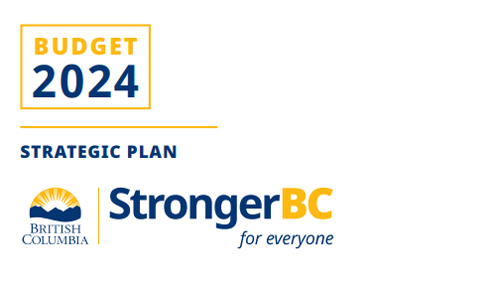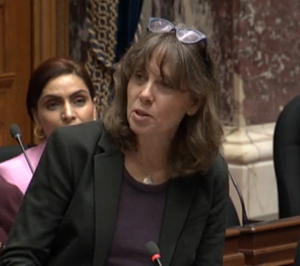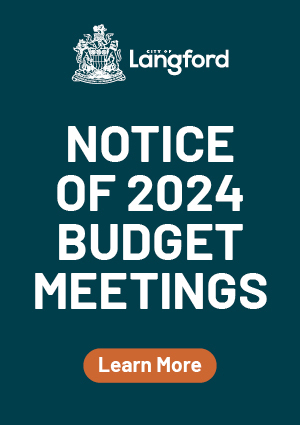Thursday February 22, 2024 | VICTORIA, BC [Updated 5:55 pm]
by Mary P Brooke | Island Social Trends
The BC NDP budget released today for 2024/25 in many ways is ‘steady as she goes’. It maintains all the supports that the ‘people first’ majority government has established over the past few years, carrying a continued deficit in the process.
The budget subtitle is “taking action for you”. | See Budget 2024 Strategic Plan [PDF]
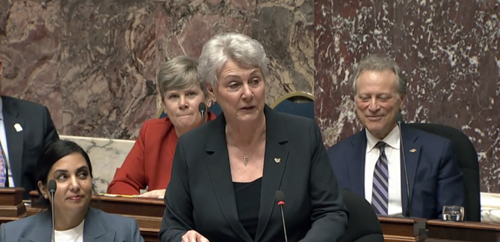
BC enjoys one of the most robust economies in the country, with a strong credit rating as a foundation as well as avoidance of most major socioeconomic disasters that could have come during or after the pandemic.
Despite the massive work that goes into a provincial budget, this year there seems to be a lack of new depth. The BC Greens say the NDP have “failed to read the room with Budget 2024”, saying “the right solutions” are not being delivered so that people can “live their lives freely and affordably”.
The NDP would argue that, with Minister Conroy having mentioned the impacts of $10-a-day and affordable child care, as well as a new electricity affordability credit this year (on the heels of last year’s flat $100 BC Hydro credit) and a one-time increase in BC Family Benefit in this new budget.
The Chartered Professional Accountants of BC says Budget 2024 “aims to combat livability and affordability challenges… with a focus on enhancing housing availability and maintaining robust levels of capital investment”.
Election coming up:
This pause on grand new budget visions comes early in an election year. Indeed, today Finance Minister Katrine Conroy said as government the NDP must continue to deliver services and that helping people out in “tough times” is “the right thing to do”. Obviously Premier David Eby is holding back the best for the upcoming election campaign promises, expected to come after the May 16 end of the spring 2024 session.
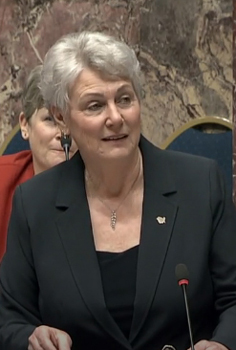
This is the last session for this current NDP majority which started under former Premier John Horgan and wraps up under Premier David Eby. A range of new legislative bills is coming — 20 in fact: “They will be encompassing, we will be busy this session. And that’s what British Columbians expect from us,” said Government House Leader Ravi Kahlon on February 20.
Population is the common factor:
The significant increase in BC’s population over the past two to three years impacts many aspects of the budget, including the largest ones like education, health care and infrastructure.
Most leaders in government and economy were caught off guard by the sudden population influx of migration to BC — mostly international but also from other parties of Canada (though the inter-provincial migration was net zero as many British Columbians head to Alberta for cheaper housing prices and the wealth associated with the oil sector).
Population increase impacts have been seen by everyone in the school system (overcrowding and many temporary classroom structures) and in health care (continued shortage of family doctors despite more coming onstream in 2023). The suddenly increased population also put pressures on housing availability (to own or rent).
The budget emphasizes critical transportation networks and community infrastructure which support the movement of goods and people, and help lower greenhouse gas emissions to support a clean and growing economy.
Population support through in-vitro fertization:
A deliverable in Budget 2024 that almost brought Finance Minister Conroy to tears in the Legislative Assembly today was the introduction of government coverage of the costs of in-vitro fertilization. This is new for BC, catching up with other jurisdictions in Canada.
This will give people already here in BC an opportunity to expand their family with the creation of a new life by this means. Starting in 2025, people in BC will be able to access one cycle of in-vitro fertilization for free.
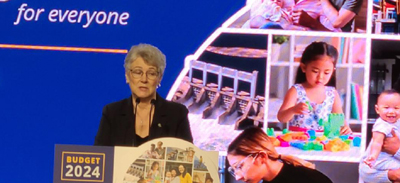
Images of babies and young children were in the backdrop of Conroy’s podium at the BC budget presentation to media today at the Victoria Conference Centre.
Impact of interest rates:
In 2023, BC’s economy posted modest growth softening due to high interest rates, slowing domestic and global economic activity, and geopolitical and climate-related disruptions.

A few times now, Premier Eby has remarked at his “frustration” at the Bank of Canada’s insistence to crank up interest rates. The impacts on individuals, families, households and businesses have been real, and in many cases stark.
While the Bank of Canada is intended to be independent from politics, even Prime Minister Justin Trudeau said this week that he hopes the rates will start coming down soon.
Housing & renters:
While the recent BC Builds program will likely speed up rental housing construction the actual reality for renters is not significantly improved — in fact, many renters are falling between the cracks.
The 3.5% cap on rent increases is only for people staying in the same unit. For people who have been inflation-evicted (or worse, renovicted) their next place to rent can be as much as 25% higher for the same size or even smaller unit, as rental property owners cover themselves for the extraordinary mortgage and and property tax increases of the past two years (due to increased interest rates in response to inflation).
Earlier this month the BC Greens called for urgent renter support, emphasizing that housing is a basic right.
The BC government today promised updates to come for the RAP and SAFER rental assistance programs that assist low-income renters and seniors who rent. The last review was done starting in 2022 and wrapped up in 2023. Today Minister Conroy said some further news will come on updates to those BC Housing rental support programs in the months ahead.
The BC Rent Bank got an additional $11 million in funding recently but that program (started in 2018) is strictly about short-term loans with no forgivable portion to reflect support under the extraordinary rent increase scenarios seen in 2024.
Housing demand is being dampened with the introduction of a flipping tax which will penalize property owners who resell within two years. The Union of BC Municipalities (UBCM) points out that the flipping tax aligns with one of their 2018 Housing Strategy recommendations.
The BC Greens today said Budget 2024 still sees the NDP government treating housing as a commodity including relying on housing market taxes while also noting that about 250,000 renters in BC spend over 30% of their income on rent.
K-12 Education:
The BC Teachers Federation (BCTF) was looking for a lot of improvement in this 2024/25 budget, but essentially got more of the same. They had hoped for more funding for teachers and specifically for teachers-on-call. By still relying on the per-pupil-ratio funding model there isn’t additional funding to cover the impacts and pivoting required in fast-growing school districts like Surrey and Sooke.
BCTF President Clint Johnston is looking for “bold action” from the BC government, but today said Budget 2024 won’t make a dent in solving acute staffing shortages in schools. Ministry staff said today that teacher salaries are covered during provincial wage bargaining; Johnston told Island Social Trends today that bargaining can occur at the school district level as well.
The Ministry is investing in capital improvements to expand schools, such as with the installation of modular classrooms (attached to schools) to help reduce the number of portable classrooms that have proliferated in recent years particularly in the Lower Mainland.
Affordability support:
This year’s version of affordability support comes in an increase to the BC Family Benefit program as well as the much-anticipated BC Hydro credit.
Last year a lump-sum credit of $100 was applied to BC Hydro customer billings at the beginning of 2023.
- This year the one-time BC Electricity Affordability Credit will be applied as a credit to billings starting April 1, 2024; the amount will be automatically calculated based on the customer’s electricity consumption over the past year (said to be on average about $100 in savings).
- The average business and industrial customer will receive savings of up to 4.6% of electricity consumption to help reduce operating costs. For the average small business customer, this will be around $400 in savings over the year.
Mental health and addictions:
Funding for mental health and addictions has increased over recent years, and in Budget 2024 that funding level is maintained. The BC United as Official Opposition said it should have been increased and expanded in this year’s budget.
the Union of BC Municipalities points out that the budget has no new funding for shelter spaces, addiction treatment and recovery, harm reduction and community mental health programs. It’s possible this is being held back for the election phase this summer and fall.
Agriculture & food security:
Over the past week or two the premier and now the finance minister have promoted the government’s intention to maintain and possibly increase the Feeding Futures food security program in schools.
The overall agriculture budget is slightly less for 2024/25 and while it covers a wide range of areas there is no specific thrust for urban-grown food supply (such as community gardens) for emergency response at the community level.
Transportation networks and community infrastructure:
Over $15 billion in capital investments will be made over the next three years, as shown in Budget 2024. That’s to “deliver the transit and transportation infrastructure to ensure British Columbians can move throughout the province”.
The transportation budget includes $248 million in capital funding over three years for BC Transit for expanded infrastructure outside the Lower Mainland to house additional buses, for new zero-emission buses, and to increase the capacity of depots and passenger facilities. As well, there will be $28 million in operating funds over three years to expand BC Transit services to support a 14.5% service increase (358,000 hours) by 2027/28.
A further $26 million will go to BC Transit to deal with base operations and inflationary pressures.
Specific mention was made today about rebuilding projects including “critical road and bridge maintenance”. Over the three-year period this will also help support jobs.
Rural and remote communities will be supported with $67 million in inland ferry operations over four years.
Climate resiliency, emergency management, and clean energy:
The Climate Resiliency and the Premier’s Expert Task Force on Emergencies section was given a special box to highlight and emphasize it within the larger document.
Climate-related emergencies are impacting the Province at an unprecedented rate, the section leads with.
Mentioned are the heat dome of 2021 (and the air conditioner installation program that followed), the costs to repair highways and roads that were washed out by floods, and more wildfire prevention programs being brought in.
The Task Force was launched in October 2023 and the Emergency and Disaster Management Act was brought in November 2023. In December 2023 an investment of $18 million was announced to enable communities to consult and collaborate in advance of emergency events.
Budget 2024 is making further investments to address climate change and emergency management capacity. Over $400 million in CleanBC programs will be delivered over four years.
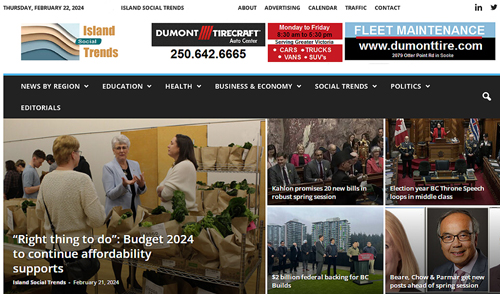
Impacts for business:
Finance Minister Conroy mentioned again today that during the pandemic small businesses in BC received funding support in the form of grants. There are no specific giveaways to business in this year’s budget.
The Employers Health Tax (EHT) which requires larger businesses to collect and submit tax — a process that a few years ago made possible the elimination of Medical Service Plan premiums, saw its threshold increased from $500,000 to $1 million. “Increasing the EHT exemption is welcome news for business,” said the Victoria Chamber of Commerce in a news release today, saying that leaves room to increase wages and promote staff which leads to greater productivity. But the Chamber also notes what they call a ‘relatively constrained’ budget in an election year, while pointing out that spending comes in at a record $7.9 billion.
“The scale of deficits” is a concern expressed by the Victoria Chamber. The budget shows a declining deficit over the coming years, given that interest rate levels are expected to soon start declining as the Bank of Canada eases off on their inflation-control measures.
===== RELATED:
- “Right thing to do”: Budget 2024 to continue affordability supports (February 21, 2024)
- Kahlon promises 20 new bills in robust spring session (February 20, 2024)
- West shore community leaders take on urban food resilience (February 10, 2024)
- Immigrant food organization gets $300K from BC 2022-2023 surplus (February 6, 2024)
- Urban food resilience requires municipal leadership (October 29, 2023)
- Two BC Agriculture programs support small rural and independent food producers (September 15, 2023)
- BC tops up food bank funding by $15 million (August 24, 2023)
- Urban food resilience directions in Langford (June 9, 2023)
- Food security program toured by Education & Agriculture Ministers (April 25, 2023)
- Feeding Futures funding expands school food programs in BC (April 5, 2023)
- Harsh economic realities at the mercy of political leadership (March 23, 2023)
- Premier Eby announces $200 million for BC food security initiatives (March 7, 2023)
- BC food security resilience directions in 2023 (March 1, 2023)
- NEWS SECTIONS: FOOD SECURITY | POLITICS
===== ABOUT ISLAND SOCIAL TRENDS:
Island Social Trends covers news of the south Vancouver Island region and provincial news, with a socioeconomic lens. Originating out of the west shore of Greater Victoria, there is also some local focus on key issues.
Island Social Trends Editor Mary P Brooke reports with the BC Legislative Press Gallery. She also has a B.Sc. in Foods and Nutrition.
Island Social Trends is an independent news service. News is posted free online at IslandSocialTrends.ca and a Premium PDF of the biweekly edition (with deeper analysis and news summaries) is available by digital subscription.


